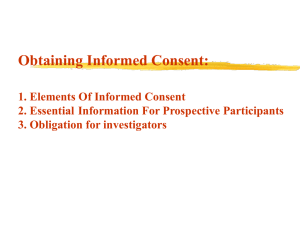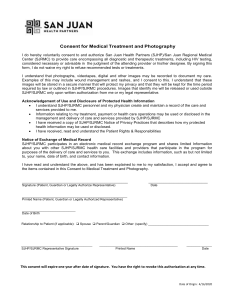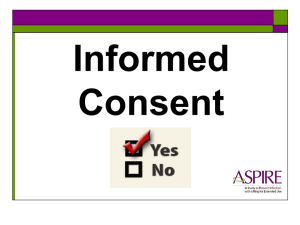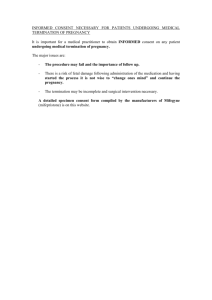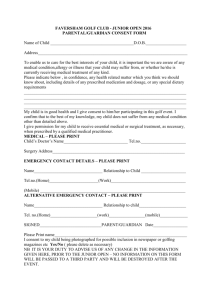DOC
advertisement
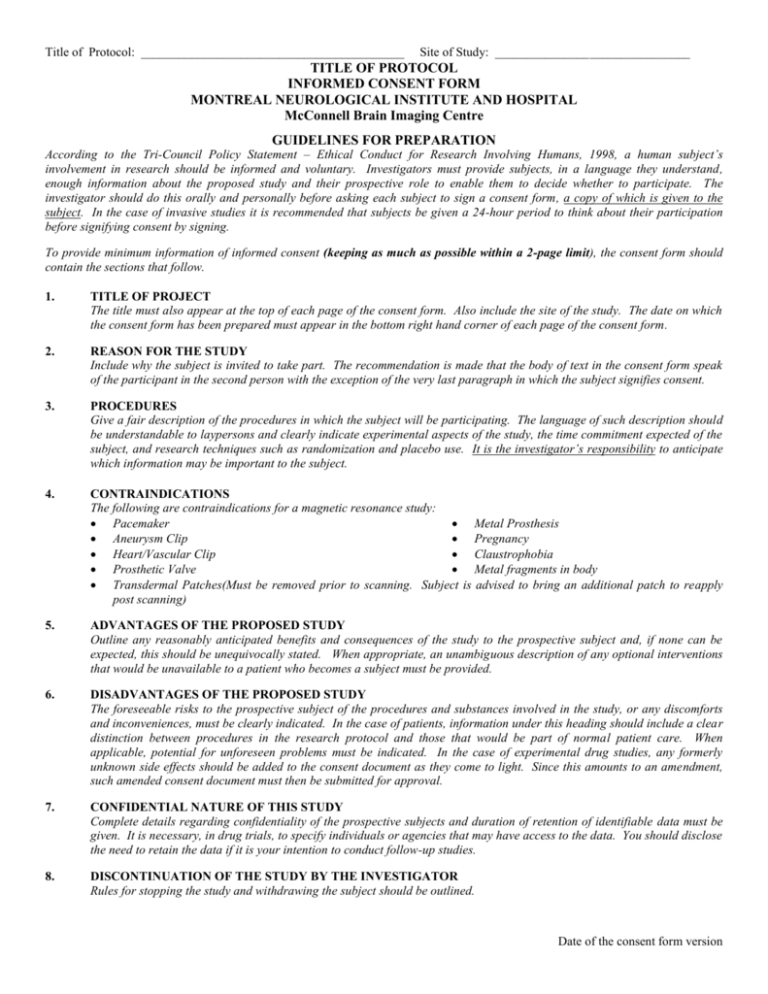
Title of Protocol: __________________________________________ Site of Study: _______________________________ TITLE OF PROTOCOL INFORMED CONSENT FORM MONTREAL NEUROLOGICAL INSTITUTE AND HOSPITAL McConnell Brain Imaging Centre GUIDELINES FOR PREPARATION According to the Tri-Council Policy Statement – Ethical Conduct for Research Involving Humans, 1998, a human subject’s involvement in research should be informed and voluntary. Investigators must provide subjects, in a language they understand, enough information about the proposed study and their prospective role to enable them to decide whether to participate. The investigator should do this orally and personally before asking each subject to sign a consent form, a copy of which is given to the subject. In the case of invasive studies it is recommended that subjects be given a 24-hour period to think about their participation before signifying consent by signing. To provide minimum information of informed consent (keeping as much as possible within a 2-page limit), the consent form should contain the sections that follow. 1. TITLE OF PROJECT The title must also appear at the top of each page of the consent form. Also include the site of the study. The date on which the consent form has been prepared must appear in the bottom right hand corner of each page of the consent form. 2. REASON FOR THE STUDY Include why the subject is invited to take part. The recommendation is made that the body of text in the consent form speak of the participant in the second person with the exception of the very last paragraph in which the subject signifies consent. 3. PROCEDURES Give a fair description of the procedures in which the subject will be participating. The language of such description should be understandable to laypersons and clearly indicate experimental aspects of the study, the time commitment expected of the subject, and research techniques such as randomization and placebo use. It is the investigator’s responsibility to anticipate which information may be important to the subject. 4. CONTRAINDICATIONS The following are contraindications for a magnetic resonance study: Pacemaker Metal Prosthesis Aneurysm Clip Pregnancy Heart/Vascular Clip Claustrophobia Prosthetic Valve Metal fragments in body Transdermal Patches(Must be removed prior to scanning. Subject is advised to bring an additional patch to reapply post scanning) 5. ADVANTAGES OF THE PROPOSED STUDY Outline any reasonably anticipated benefits and consequences of the study to the prospective subject and, if none can be expected, this should be unequivocally stated. When appropriate, an unambiguous description of any optional interventions that would be unavailable to a patient who becomes a subject must be provided. 6. DISADVANTAGES OF THE PROPOSED STUDY The foreseeable risks to the prospective subject of the procedures and substances involved in the study, or any discomforts and inconveniences, must be clearly indicated. In the case of patients, information under this heading should include a clear distinction between procedures in the research protocol and those that would be part of normal patient care. When applicable, potential for unforeseen problems must be indicated. In the case of experimental drug studies, any formerly unknown side effects should be added to the consent document as they come to light. Since this amounts to an amendment, such amended consent document must then be submitted for approval. 7. CONFIDENTIAL NATURE OF THIS STUDY Complete details regarding confidentiality of the prospective subjects and duration of retention of identifiable data must be given. It is necessary, in drug trials, to specify individuals or agencies that may have access to the data. You should disclose the need to retain the data if it is your intention to conduct follow-up studies. 8. DISCONTINUATION OF THE STUDY BY THE INVESTIGATOR Rules for stopping the study and withdrawing the subject should be outlined. Date of the consent form version Title of Protocol: __________________________________________ Site of Study: _______________________________ 9. WITHDRAWAL FROM THE STUDY The right of the subject to withdraw from the study at any time without jeopardy of any kind, including ongoing and subsequent clinical care should be stated. It should also be indicated that any useful data obtained prior to withdrawal will be kept on record and used for research purposes and data analysis unless the subject provides written refusal to allow this. The subject should know that any secondary use of this data would be restricted to a research protocol in the same or related area of study and it would be require approval of the REB (Research Ethics Board). 10. INCIDENTAL FINDINGS There should be an indication that the images are not routinely examined for abnormalities. However, should there be any incidental findings, they will be communicated to the subjects and upon their request, to their physicians 11. PROCEDURES OR TREATMENTS ALTERNATIVE TO A PROPOSED NEW THERAPY To be described in all studies funded by USA granting agencies. 12. EFFECTS OF PARTICIPATION IN THIS STUDY A clear statement whether Magnetic Resonance Imaging interferes with treatment. 13. SUBJECT’S AGREEMENT TO BE CONTACTED BY THE RESEARCH ETHICS BOARD A statement should be included that the patient agrees to be contacted by a member of the Research Ethics Board, at the discretion of the board. The subject should also be made aware that the Research Ethics Board or quality Assurance Officers duly authorized by it may access study data. 14. COMPENSATION FOR PARTICIPATION IN THE STUDY Please indicate on the consent form if you plan to compensate the subject. If so, indicate the amounts and if there are any conditions on compensation or partial compensation for time and inconvenience. Because it is contrary to Quebec law to pay subjects for being subjects, the term remuneration should not be used as a heading or in the text of the consent form. 15. CONTACT INFORMATION FOR SUBJECT Include here a statement that should the subject have any questions about rights as a research subject and wishes to discuss them with someone other than the individual(s) conducting the study, the subject should contact the Montreal Neurological Hospital, Patient Ombudsman at (514) 934-1934, X 48306. Any other kinds of comments or concerns or assistance needed regarding participation as a research subject in the project can be addressed to the Montreal Neurological Hospital Patients’ Committee, Room 354, tel. (514)398-5358. The subject should also be informed that the consent form should not be signed without having had a chance to ask and receive satisfactory answers to all questions the subject may have. In addition, the investigator should provide the subject with a name and telephone number for any later enquiries about the project. 16. RESEARCH INVOLVING SPECIAL POPULATIONS Special rules apply with research involving children and mentally or legally incompetent adults. Investigators contemplating research involving such individuals should contact the Chairman of the Research Ethics Board. 17. ARRANGEMENT OF DOCUMENTS FOR SUBMISSION The document, Declaration of Consent, which is on a separate sheet, should follow the consent documents, after which is placed the MRI questionnaire. The subject must receive a copy of the signed consent document. NOTE: It is understood that points listed in these guidelines may not fulfil all the requirements for informed consent in certain projects or by certain granting agencies. In these special cases, additional information may be required and it is the responsibility of the investigators to anticipate what it may be. Date of the consent form version


